GALLUP NEWS SERVICE
PRINCETON, NJ -- After six years of a Republican lock on power in Washington, Americans seem ready for greater political diversity in national politics -- either in the form of divided government or a competitive third party.
The latest Gallup Poll records a notable increase compared to 2005 in the percentage of Americans wanting Congress and the White House to be controlled by different parties rather than by the same party. Republicans as well as Democrats are showing more support for divided government. Also, since 2003 there has been a modest increase in support for a competitive third party to take hold in American politics. On both questions, close to half of Americans now favor a change from the current norm.
Plurality Now Favors Divided Government
According to the survey from Sep. 7-10, 2006, close to half of Americans (48%) think it is better for the country to have a president from one political party and Congress controlled by another. Only 37% favor having the two branches of government controlled by the same party.
A year ago at this time -- and for most of the past six years -- Americans were about equally divided in their preferences on this question. Thus the latest result represents a departure from past attitudes.
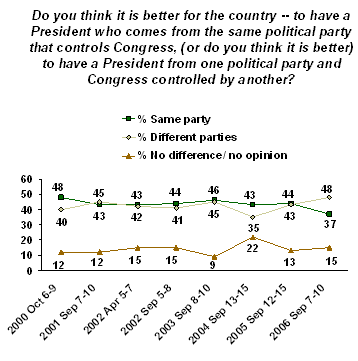
Partisans Differ on One-Party Rule
Gallup's first measure of this question came toward the end of the Clinton administration in 2000 when government power was divided between the Democratic Party holding the executive branch and the Republicans in control of Congress. At that point, Republicans and Democrats shared similar preferences for one-party control of government versus divided government: a slight majority favored one-party control while about a third favored shared control.
By the following year both branches of government were led by the Republican Party under President George W. Bush and the Republicans in Congress. Nine months into Bush's first term, a Sept. 7-10, 2001, Gallup Poll found Democratic support for one-party control of government down to 40% (from 54% the year before when Bill Clinton was president) while Republican support increased slightly (from 53% to 57%). The views of independents -- who are typically less supportive of same-party government than Republicans or Democrats -- did not change over this period spanning a shift in power toward the Republicans.
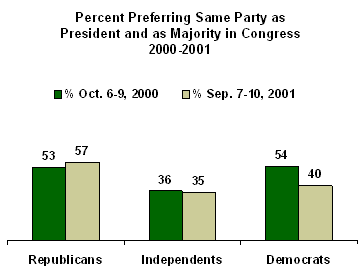
Across Bush's tenure as president, Republican support for consolidating government power in the hands of one party swelled to 70% in September 2003, but dropped to about 60% in 2004 and 2005, and slipped further to 51% this year. Democrats' much lower support for one-party control remained at about 40% from the 2001 through 2005, but then dropped over the last year to 35%. Independents have shown a more gradual decline in support for one-party control, from 35% in 2002 to 28% today.
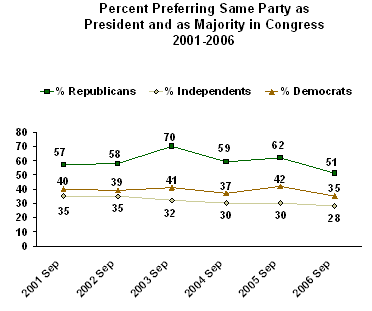
The latest survey included a different trend question about divided government (asked since 2002) that offers respondents a third response alternative of "makes no difference." On this basis, Gallup also finds a slighter shift in favor of divided government. Overall, 28% of Americans today say it is better for the president and majority in Congress to be from the same party, while 32% favor different parties and 36% say it makes no difference. These results are similar to last year at this time, but like the previous question also reflect a decline in support for one-party control since 2004.
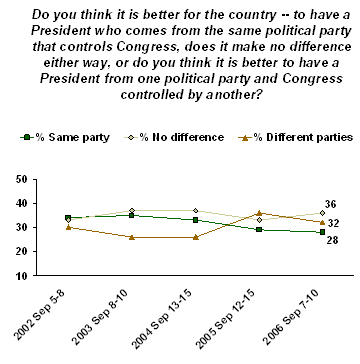
Third Party Looking Better to Democrats and Independents
Americans are now closely split on the need for a strong third party to compete with the Republican and Democratic parties: 45% say the Republican and Democratic parties do an adequate job of representing the American people while 48% agree with the statement that "[the Republican and Democratic parties] do such a poor job that a third major party is needed."
This is a change from October 2003 when a solid majority felt the two major parties were sufficient and only 40% wanted a third party.
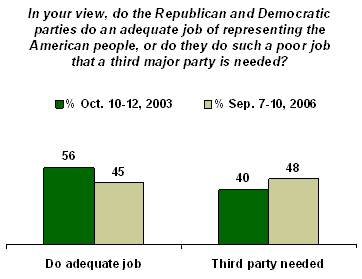
Since 2003, support for a competitive third party has declined among Republicans while it has increased among independents and Democrats. Today, only 30% of Republicans compared with almost two-thirds of independents and half of Democrats believe a strong third party is necessary.
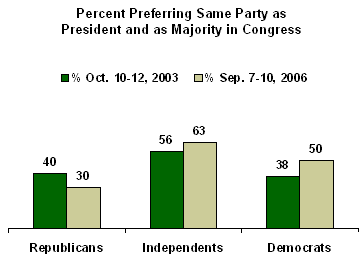
Little Linkage Between Support for Divided Government and Government Performance
The percentage of Americans approving of the job performance of President Bush and Congress has gone up and down since the start of Bush's term -- rising in the first year following the Sept. 11th terrorist attacks, and then gradually declining over the next several years. However, across most of this period, Americans preference for divided control of government remained about the same. Only in the past year has there been a significant change in the percentage favoring one-party control of government, dropping 7 points.
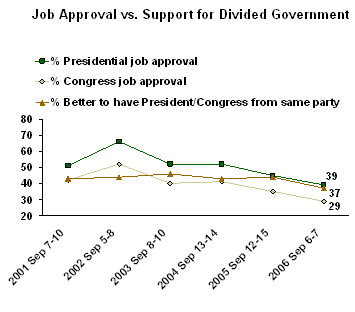
Survey Methods
These results are based on telephone interviews with a randomly selected national sample of 1,002 adults, aged 18 and older, conducted Sept. 7-10, 2006. For results based on this sample, one can say with 95% confidence that the maximum error attributable to sampling and other random effects is ±3 percentage points. In addition to sampling error, question wording and practical difficulties in conducting surveys can introduce error or bias into the findings of public opinion polls.
19. In your view, do the Republican and Democratic parties do an adequate job of representing the American people, or do they do such a poor job that a third major party is needed?
|
Do adequate job |
Third party needed |
No opinion |
|
|
% |
% |
% |
|
|
2006 Sep 7-10 |
45 |
48 |
7 |
|
|
|
|
|
|
2003 Oct 10-12 |
56 |
40 |
4 |
Thinking about the country more generally,
Q.20-21 SPLIT SAMPLED
20. Do you think it is better for the country -- [ROTATED: to have a President who comes from the same political party that controls Congress, (or do you think it is better) to have a President from one political party and Congress controlled by another]?
BASED ON -519-NATIONAL ADULTS IN FORM A
|
|
|
No difference (vol.)/ |
|
|
% |
% |
% |
|
|
2006 Sep 7-10 |
37 |
48 |
15 |
|
|
|
|
|
|
2005 Sep 12-15 |
44 |
43 |
13 |
|
2004 Sep 13-15 |
43 |
35 |
22 |
|
2003 Sep 8-10 |
46 |
45 |
9 |
|
2002 Sep 5-8 |
44 |
41 |
15 |
|
2002 Apr 5-7 |
43 |
42 |
15 |
|
2001 Sep 7-10 |
43 |
45 |
12 |
|
2000 Oct 6-9 |
48 |
40 |
12 |
|
|
|
|
|
|
Extended Trend: Do you think it is better for the country to have a President who comes from the same political party that controls Congress, or do you think it is better to have a President from one political party and Congress controlled by another? |
|||
|
|
|
|
|
|
|
|
No difference (vol.)/ |
|
|
% |
% |
% |
|
|
2002 Apr 5-7 |
41 |
43 |
16 |
|
2001 Sep 7-10 |
42 |
46 |
12 |
|
2000 Oct 6-9 |
45 |
42 |
13 |
|
1998 Apr 17-19 |
40 |
42 |
18 |
|
1997 Sep 25-28 |
31 |
45 |
24 |
|
1997 Aug 22-25 |
42 |
41 |
17 |
|
1994 Oct 7-9 |
45 |
37 |
18 |
|
1994 Jan 15-17 |
46 |
36 |
18 |
|
1993 Aug 8-10 |
48 |
37 |
15 |
|
|
|
|
|
|
CBS/NYT Trend: |
|
|
|
|
1992 Sep |
47 |
31 |
22 |
|
1989 Sep |
35 |
45 |
20 |
21. Do you think it is better for the country -- [ROTATED: to have a President who comes from the same political party that controls Congress, does it make no difference either way, or do you think it is better to have a President from one political party and Congress controlled by another]?
BASED ON -483-NATIONAL ADULTS IN FORM B
|
Same |
No |
Different parties |
No |
||
|
% |
% |
% |
% |
||
|
2006 Sep 7-10 ^ |
28 |
36 |
32 |
3 |
|
|
|
|
|
|
||
|
2006 Jun 23-25 |
26 |
38 |
31 |
5 |
|
|
2005 Sep 12-15 ^ |
29 |
33 |
36 |
2 |
|
|
2004 Sep 13-15 ^ |
33 |
37 |
26 |
4 |
|
|
2003 Sep 8-10 ^ |
35 |
37 |
26 |
2 |
|
|
2002 Sep 5-8 ^ |
34 |
33 |
30 |
3 |
|
|
|
|
|
|
||
|
^ |
Asked of a half sample. |
||||